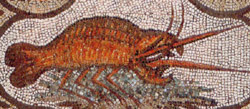
You are in: Home Page » Recipes of the ancient Pompeii » LOCUSTAS ET SCILLAS (Big Shrimps)
LOCUSTAS ET SCILLAS (Big Shrimps)

(Apic. exc. 17) Ingredients:
- 500 g cooked and prepared big shrimps
- 1 tsp green pepper
- 1 tblsp Privet
- 1/2 tsp ground celery seeds
- 2-3 tblsp vinegar
- 100 ml Liquamen (or 1/2 tsp salt)
- 4-5 hacked hard-boiled egg yolks
Instructions:
-------------
Cook shrimps. Then mesh ground pepper, celery seeds and privet. Pour
vinegar, Liquamen and egg yolks over it and mix thoroughly. Pour the
mixture over the shrimps and serve.





